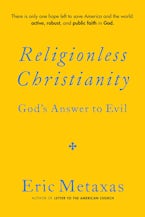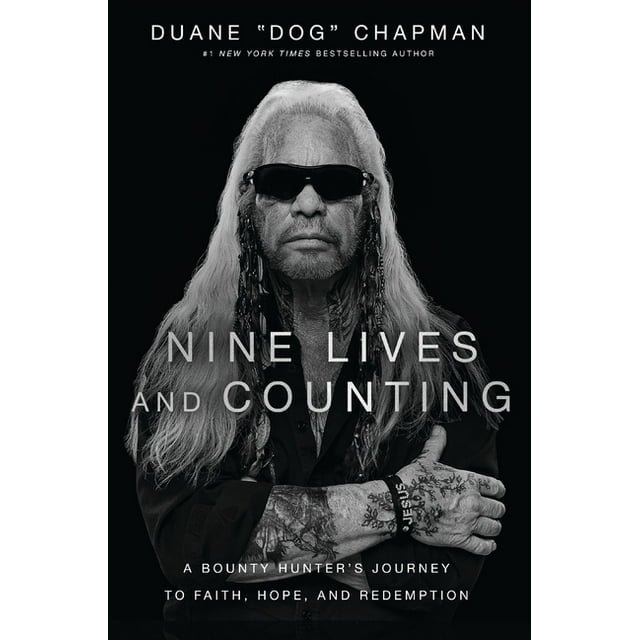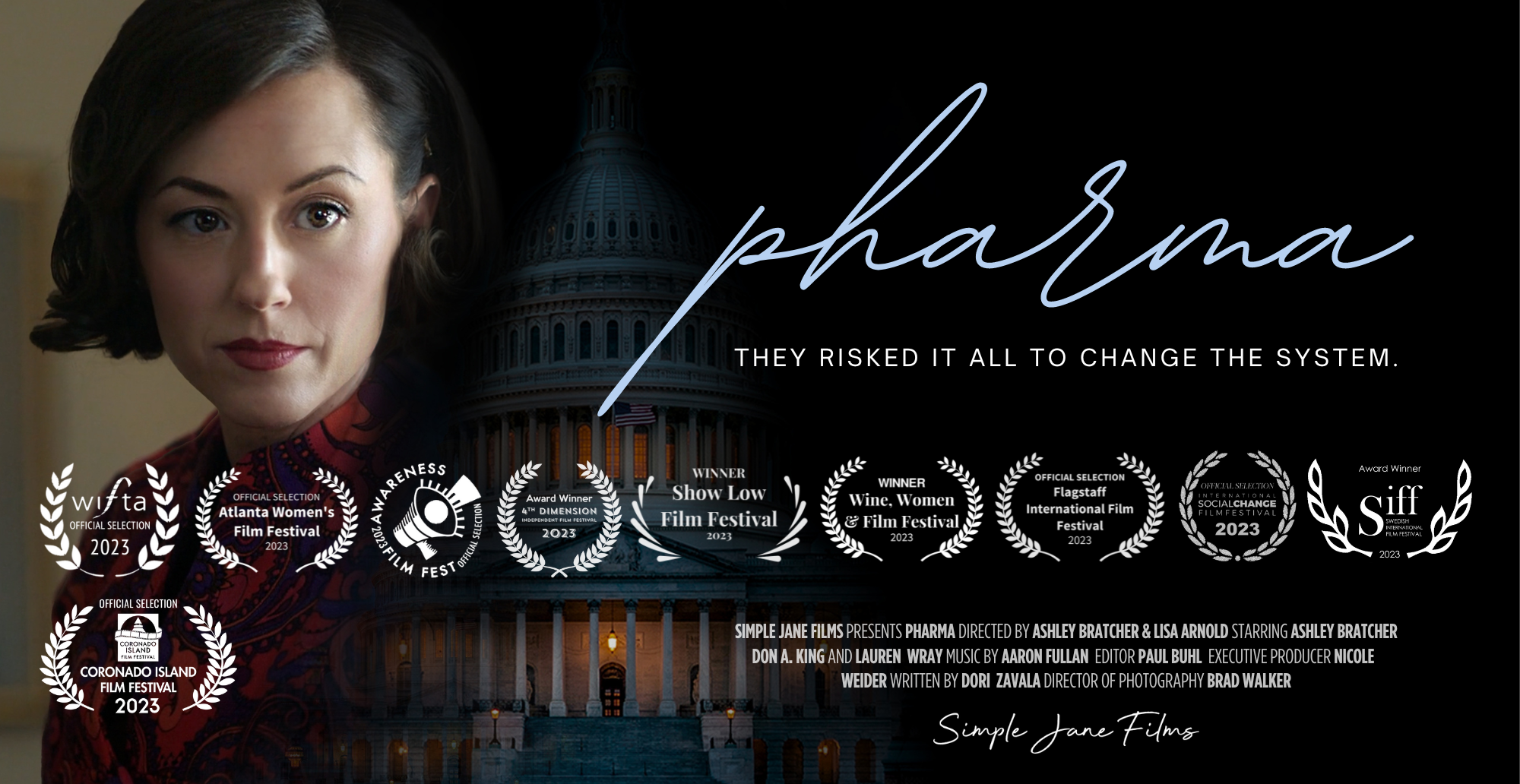Here’s the latest from the crossroads of faith, media & culture: 04/22/24
JWK: Is it fair to say, Religionless Christianity grows out of Letter to the American Church?
Eric Metaxas: Basically, it does, yes, but, at the same time, it stands on its own.”Religionless Christianity” is a phrase made famous by the great Dietrich Bonhoeffer. Many people know that I wrote a biography of Dietrich Bonhoeffer. It was the first time that I became acquainted with the term “religionless Christianity.” What I didn’t realize was that it was a very controversial term because it was misinterpreted.
In the book Religionless Christianity I tell the story of how Bonhoeffer used this phrase. He was in the Gestapo prison in the last year of his life before he was murdered by the Nazis. He used this phrase in a letter to his best friend Eberhard Bethge. Eberhard Bethga was his best friend and really carried his legacy after he died. Bethga was, like Bonhoeffer, a theological genius and somebody that understood Bonhoeffer, being very close to him.
So, in this letter Bonhoeffer say, deceptively, “What happened in Germany? Here we are, I’m in this Gestapo prison, Germany has been lost to the evil of the Nazis. How did we fail?” Bonhoeffer, answering his own question really, says “What we needed – and what we didn’t have – was a religionless Christianity.” In other words, he’s using the word “religion” as a pejorative – saying that it was just religiosity. It was just playing church, people saying that “Oh, we just want to preach the Gospel. We don’t want to get involved in standing against the Nazis.” He said “If we had had a real Christianity – a religionless Christianity – that was willing to live out that faith heroically, as God calls us to do, we would not have ended up here.”
So, he uses that phrase “religionless Christianity” as the idea of what could have stood against evil. I say we need to use that phrase – and we need to understand that concept. What does it mean, on the one hand, to really live out your faith, to live out religionless Christianity the way Bonhoeffer says, and then what does it look like when Christians fail to do that? What does it look like when we are being merely religious? When we’re playing at religion. When we’re playing at church? We’re playing church rather being the Church? It strikes me that that is the central issue of our day. It is why evil is prevailing in our culture – because many Christians have somehow adopted this false “religious” idea of the faith versus the actual faith that martyrs have died for, that Jesus and the Apostles gave to us.
JWK: When it comes to applying the lessons of Nazi Germany to America and the world today, have you found that people have been agreeing with you or have you been meeting with resistance? What sort of response have you been getting?
EM: I have to say that the response has been overwhelmingly positive. It’s been extraordinary to see people not just getting this but wanting to be the solution – wanting to really be the Church, as I say, and not play at being the Church. I think there are many people also that realize that they have been going to churches that have just been playing church.
I refer to, in the book Religionless Christianity, this apocryphal story of the early part of World War II. Jews are being taken in boxcars to the death camps. A particular church heard the cries of those in the boxcars which ran very near the church. The pastor just said “Sing louder,” in a sense, to drown out this unpleasant sound “Let’s just sing for the Lord!”…Bonhoeffer actually said that “He who does not speak out for the Jews has no right to sing Gregorian chants, has no right to sing hymns to God, if he is not doing what God has called him to do in the first place.” That’s a dramatic statement and it’s a dramatic indictment of the German Christians at a time when God was calling them to be His voice against evil. We know what happened in Germany. The question is do we see it happening today?
I see the same thing happening today. Many people are saying “We don’t do politics in our church. We don’t want to get involved in anything controversial.” God is calling you to get involved in these controversial things for the sake of people who are suffering. We’re commanded to love our neighbors. If you’re commanded to love your neighbors you’re gonna do anything you can, including get involved politically if necessary, to make sure that you’re neighbors are blessed and that they can live in a country where there is justice for all, where there is religious liberty, where is love for those who are suffering and that we would do what we can. That doesn’t happen by itself. God’s people have always been central in those kinds of things.
So, there are times when the Church says “We don’t want any trouble.” Well, God calls us to that trouble. It’s why we were born into the world and why He died for us on the Cross. This is really a moment in America where we get to decide which side do I want to be on? Do I want to be just playing church and be guilty the way that many Germans were guilty at that time or do I want to be part of the solution. I really think that the stakes could not be more dramatic, unfortunately.
JWK: What you’re saying reminds me of “good trouble,” a phrase associated with the late Rep. John Conyers regarding the Civil Rights movement. (He once said “Get in good trouble, necessary trouble, and help redeem the soul of America.”) Are you saying the same thing, more or less?
JWK: It seems to me that since we last spoke, which isn’t that long ago, that blatant anti-Semitism, not to mention anti-Americanism, has, if anything, only picked up steam.
EM: To me, that’s part of the bigger picture. When you see evil rising in these various guises you know that it is evil but then, at some point, when it becomes openly hostile to God’s Chosen People – to Israel – that’s always the signature of the diabolical. You have that, obviously, in Germany in the thirties. When you have people calling for death to the Jews you know, at that point, what you’re dealing with. It’s no longer in the shadows. Now it’s out in the open.
JWK: Would you say that’s where we are right now in America and in the world?
EM: There’s no doubt. I always bring up Romans 8:28 – “All things work together for good for those who love the Lord and are called according to His purposes.” All of these evil things being exposed – coming out into the open – is a good thing because it is waking up those who might still be asleep. In other words, I think that the attack on October 7th in Israel is so horrible that it has awakened people who were otherwise asleep. So, I think that is where we are. We’re having a host of evil things happen. The most dramatic ones – the October 7th attack last year and, recently, Iran’s attack – just underscore what it is that we’re dealing with. We’re dealing with the enemies of God. Bonhoeffer understood this. He knew that the attack on the Jews at Kristallnacht, for example – I write about this in my Bonhoeffer book – was an attack on God. That was an attack on God and on God’s people. He stood with the Jews. That’s the question today. Will you stand with the Jews or will you be deceived by those on the left who, in their heart, are anti-Semitic.
JWK: And, it sounds like you’re saying, not only antisemitic but anti-American and anti-God.
EM: That’s always at the heart of it. What we’re really talking about are forces hostile to God. If you hate God you’re gonna hate America because America might be flawed but it has stood for God’s principles. It was founded on God’s principles. We would not have liberty in the way that we do if people hadn’t understood The Bible and hadn’t understood what The Bible says about human beings and our ability to govern ourselves, to be a shining “city on a hill” (in) the words of John Winthrop which were echoed by so many Americans and which, of course, are the words of Jesus – that we are to be symbol to the whole world.
There is something inextricably intertwined when you’re talking about freedom on the American model and faith in the God of The Bible. There’s no escaping it. We would not have America if not for people who had believed in the God of The Bible – and without the First Great Awakening in the 18th Century you would not have had the possibility of America.
So, the enemies of God hate America. They hate Israel. They hate all of the principles that are in The Bible and they hate people who stand for those principles. So, we’re seeing that in our time. God calls his people to stand and to fight against this and to stand up for God’s principles. So, if you’re going to a church that is not involved in that, I would say get out of that church because then you’re complicit.
JWK: Would you say we’re actually in an existential crisis right now?
EM: I say it literally on the first page of the book. On the first page of my book…I say explicitly that this is the third existential crisis in American history. The first was the Revolution. The second was the Civil War. We are now in a dramatic existential crisis. I am not overstating it. It is absolutely a crisis for the soul of the nation. We will cease to exist. We are beginning to cease to exist as America if we don’t trust our elections, if we don’t trust all of our institutions – our institutions of justice, journalism and the medical establishment. If we see corruption everywhere, if we cease to have actual borders, America ceases to exist. It’s a very dramatic situation. I hope I clarify it in the book but I think that people need to be aware that that is exactly what is happening. We are on the verge of ceasing to exist. If the People of God do not stand up, understand where we are and fight, we will cease to exist – just as Germany was effectively wiped out by the evil of the Nazis.
JWK: And how should the Church and the people fight? What is the appropriate path forward?
EM: I don’t know if I quote it in the book but the famous Dutch theologian and statesman Abraham Kuyper once said that “There’s not one square inch of all creation over which Jesus Christ, who is sovereign, does not say “Mine!” Of course, that’s a biblical idea. What that means is that we are to take our faith into every single sphere. We’re not supposed to keep our faith locked inside the Church, inside this theological realm. We’re supposed to take our faith out into the marketplace, into politics, into the culture, into our school board meetings. We’re to live out our faith everywhere we can go, everywhere we can take it. We’re to take God’s principles into the marketplace. That’s going to produce conflict but God has called us to do that.
Everybody’s called to a different place. Not everybody’s called to run for school board or whatever it is but we’ve got to live out our faith. I would say to people who say “I just want to do church” or “I want to keep my faith inside this theological ecclesiastical bubble” you’re missing it. That’s not what the Church is. The Church is called to exist outside of the four walls of the church building. The church building is only where the Church meets. We’re supposed to be the Church outside of the church building. We’re supposed to live out our faith everywhere. That often means getting involved politically. It means getting involved in every way you can and just asking God to lead you. I hope in the book I will help people figure out how to do that.
JWK: Are you confident that we can turn things around?
EM: I’m confident that we can turn things around. I’m not confident that we will turn things around. In other words, it’s up to the Church to rise to the occasion. Will that happen? I don’t know. I’m confident that God would not have called me to write these books, to talk about this and to make the film Letter to the American Church – which people can see at the website LettertotheAmericanChurch.com – if it wasn’t His will that we get it right (as opposed to) the way that the German Church got it wrong.
I believe it’s His will that we get it right but it is up to people now hearing this message. Will they rise to the occasion or won’t they? Every single person could be the tipping point. It’s really up to the Church. Will the Church be the Church? Will enough people who say “I’m a Christian” actually say “Now I’m going to live as a Christian. Now I’m going to ask God to lead me this way.” So, I’m confident that we can turn it around. I don’t know that we will. I hope that we will but I simply don’t know.
John W. Kennedy is a writer, producer and media development consultant specializing in television and movie projects that uphold positive timeless values, including trust in God.
Encourage one another and build each other up – 1 Thessalonians 5:11




